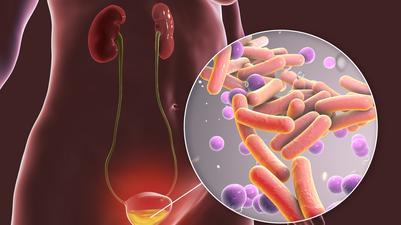Disease name: Urinary Tract Infections
ICD-10 Disease Code: N39.0 - Urinary tract infection, site not specified
ICD-10 Disease Group: N39 - Other disorders of urinary system
General description:Urinary tract infections (UTIs) are bacterial infections affecting the urinary system, which includes the kidneys, ureters, bladder, and urethra. These infections most commonly involve the bladder and urethra, causing inflammation and discomfort. UTIs are the second most common type of infection in the body.
UTIs are generally caused by bacteria, with Escherichia coli (E. coli) being the most common cause. Risk factors such as diabetes, bladder catheterisation, or spinal cord injuries may increase susceptibility.
Disease frequency:Urinary tract infections (UTIs) can occur in anyone but are notably more common in women, who are four times more likely to experience them than men. Risk is higher in individuals with conditions such as diabetes, those using catheters, or those with spinal cord injuries.
Symptoms:Symptoms of a UTI include pain or burning during urination, frequent and urgent need to urinate, pressure in the lower abdomen, cloudy or reddish urine, and bad-smelling urine. Less common symptoms may include fever, tiredness, shakiness, back pain, or nausea.
Treatment:UTIs are typically treated with antibiotics. It is important to seek medical care if symptoms persist or worsen to prevent complications. Increasing fluid intake, practicing good hygiene, and avoiding irritants like harsh soaps can help reduce the risk of UTIs.
Sources:- https://www.icd10data.com/
- https://www.orpha.net/consor/cgi-bin/index.php
- https://rarediseases.org/
- https://medlineplus.gov/genetics/
- https://www.cdc.gov/




